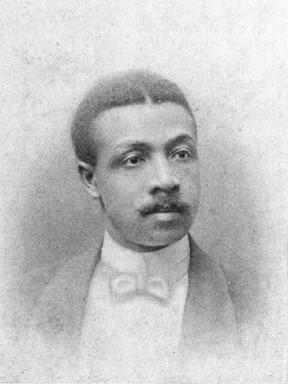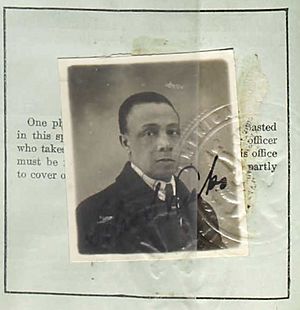Seth Weeks facts for kids
Silas Seth Weeks (born September 8, 1868 – died December 1953) was an American musician and composer. He played many instruments like the mandolin, violin, banjo, and guitar. Even though he played several instruments, he focused mostly on the mandolin for his career. He is thought to be the first African American to play the mandolin during its most popular time, known as its "golden period." He helped make the mandolin a very important instrument in the early 1900s. In 1900, he was the first American known to write a concerto for the mandolin. He also led a mandolin and guitar orchestra in Tacoma, Washington.
About Silas Seth Weeks
Weeks was born in Vermont, Illinois. One of his main goals was to make the mandolin sound complete on its own, without needing other instruments. He played in a special way called "duo style." This means the mandolin plays the main tune, a second tune, and all the harmony at the same time. When done well, duo style makes one mandolin sound like "two or more instruments" playing together. A music review from Lyon and Healy in Chicago said he was very successful at this. They noted that he included harmony with the melody in most of his music.
Weeks traveled all over America, performing and teaching. He visited public schools in cities like Chicago, Boston, Salt Lake City, and San Francisco. He also performed in New York City, Philadelphia, and Providence, Rhode Island. He even played internationally in Montreal, Canada.
He wrote and arranged his own music and performed his works during his tours. He became so well-known that he was able to tour Europe, visiting England, France, and Russia. He lived in Europe for a while, first in London. When World War I started, he returned to New York with his family and played in jazz bands. In 1920, he went back to Europe, settling in France. He performed at the Apollo theater in Paris. We don't know exactly where he died, but his death was reported in the New York Amsterdam News newspaper on January 9, 1954.
He admired other mandolin players of his time, such as Samuel Siegel, W. Eugene Page, Valentine Abt, J. W. Marler, W. L. Barney, and Fred Lewis.
His Recordings
Silas Seth Weeks made recordings with Edison Records in London and with Berliner Gramophone in Berlin while he was touring Europe. Many of his recordings are now lost or not well-known. Some of his music is available on special compact disc sets about Black musicians who made music in Europe.
Some of the recordings that have survived include:
- Poet And Peasant
- Concert Polka (recorded in 1901, 1903, or 1904)
- Handicap March (recorded in 1901, 1903, or 1904)
- Georgia Camp Meeting (recorded in 1901 or 1903)
- Hungarian Dance (recorded in 1904)
- Soldiers In The Park (recorded in 1903 or 1904)
Many other recordings by Weeks are thought to be lost. These include titles like Allegro, The Charlatan March, and The Washington Post March.
His Family Life
Silas Seth Weeks was the father of Fay E. Allen, who was also a talented musician. Father and daughter often played music together. On one special occasion, they were even invited to perform for King Gustav of Sweden. Fay E. Allen later became a well-known music teacher. She was also the first African American to serve on the Los Angeles Board of Education.
See also
- List of mandolinists (sorted)
 | George Robert Carruthers |
 | Patricia Bath |
 | Jan Ernst Matzeliger |
 | Alexander Miles |



